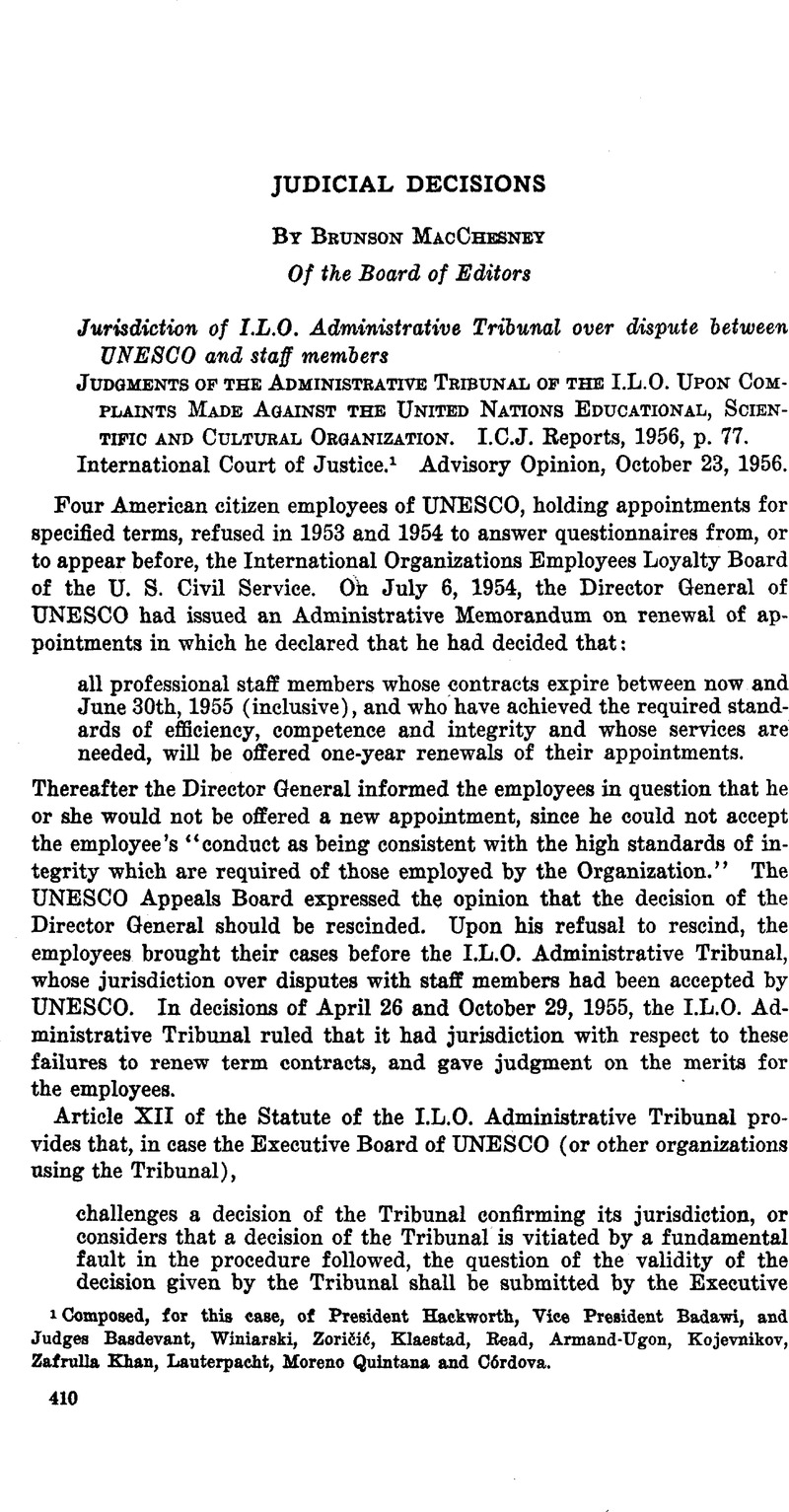No CrossRef data available.
Article contents
Judgments of the Administrative Tribunal of the I.L.O. Upon Complaints made against the United Nations Educational, Scientific and Cultural Organization
Published online by Cambridge University Press: 28 March 2017
Abstract

- Type
- Judicial Decisions
- Information
- Copyright
- Copyright © American Society of International Law 1957
References
1 Composed, for this case, of President Hackworth, Vice President Badawi, and Judges Basdevant, Winiarski, Zoričić, Klaestad, Read, Armand-Ugon, Kojevnikov, Zafrulla Khan, Lauterpacht, Moreno Quintana and Córdova.
2 Art. II, par. 5, reads: “The Tribunal shall also be competent to hear complaints alleging non-observance, in substance or in form, of the terms of appointment of officials and of provisions of the Staff Regulations of any other intergovernmental international organisation approved by the Governing Body which has addressed to the Director-General a declaration recognising, in accordance with its Constitution or internal administrative rules, the jurisdiction of the Tribunal for this purpose, as well as its Rules of Procedure.” UNESCO had accepted the jurisdiction and Rules of Procedure of the Tribunal.
3 Judges Winiarski, Klaestad and Zafrulla Khan, in separate (but not dissenting) opinions, and Córdova in a dissenting opinion, thought that the Court should not have given any Opinion in response to the request. All of them except Sir Zafrulla Khan (who expressed no opinion on the answers given) indicated their concurrence in the answers of the majority if any Opinion were to be rendered.
Judge Kojevnikov voted to comply with the request for an opinion, and in favor of the decisions on Questions I and III; but in a brief declaration said he could not fully concur in the majority reasoning and that he thought Question II should have been answered in the affirmative.
President Hackworth, Vice President Badawi, and Judge Read gave dissenting opinions, believing the Court right in rendering an opinion, but wrong in its answers to Questions I and III, since they believed that the Administrative Tribunal lacked competence to hear the complaints. In contrast, Judge Córdova’s dissent was confined to the point that no opinion should have been given by the Court in what was essentially a controversy between an international organization and individuals.
1 See decision of court below, digested in 50 A.J.I.L. 431 (1956).
1 U. S. Dist. Ct., S.D.N.Y., 1941, 1941 A.M.C. 483.
2 Decision digested in 47 A.J.I.L. 713 (1953).
* Digests of this and the following English eases supplied by Prof. Hardy C. Dillard of the Board of Editors.
1 The case referred to by the Lord Justices is Ulen & Co. v. Bank Gospodarstwa Krajowego (National Economic Bank), 24 N.Y.S. 2d. 201 (1940), inaccurately but pardonably identified on p. 963 as “a decision of the Court of Appeal of the state of New York.”—Ed.
1 Material made available through courtesy of Howard E. Hensleigh of Washington, D. C.
* Prepared by Professor Covey T. Oliver of the Board of Editors.
* No reference to treaty having been made, it is assumed that Portugal’s request was based on comity rather than treaty.—Ed.
1 Unpublished; digested by Wm. W. Bishop, Jr., of the Board of Editors, from mimeographed copy made available by an officer of the Department of State.
2 Under Art. 83 of the Italian Peace Treaty, and consisting of A. J. Matturri as U. S. Representative, Antonio Sorrentino as Italian Representative, and Judge Plinio Bolla of Switzerland as “third member.” See 50 A.J.I.L. 150 (1956)Google Scholar for digests of other cases decided by this Commission.
3 Art. 78, par. 6, provides: “United Nations nationals and their property shall be exempted from any exceptional taxes, levies or imposts imposed on their capital assets in Italy by the Italian Government or any Italian authority between September 3, 1943, and the coming into force of the present Treaty for the specific purpose of meeting charges arising out of the war or of meeting the costs of occupying forces or of reparation payable to any of the United Nations. Any sums which have been so paid shall be refunded.” T.I.A.S. No. 1648; 61 Stat. 1245; 42 A.J.I.L. Supp. 47,77 (1948).


